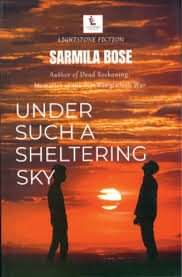Under Such a Sheltering Sky

Paperback: 196 pages
|
Sarmila Bose’s debut novella, Under Such a Sheltering Sky, is a touching tale of ordinary people surviving in extraordinary times. The book follows the life of a Bengali family, residing in Dhaka during the turbulent 1970s. Notable works of Bose, a journalist and a lawyer with a doctorate in political economy and government from Harvard University, include Dead Reckoning: Memories of the 1971 Bangladesh War.
Bose follows the life events of two protagonists, Milon, a boy who supports a leftist party in Dhaka, and Capt Sameer, a Pakistani army officer. She dabbles in two opposing characters to display a neutral perspective on the separation of Bangladesh from Pakistan. Belonging to a Bengali family, she beautifully highlights how people’s lives were turned upside down during and after the war. The book begins by highlighting the political situation of East Pakistan in the 1970s. Milon’s father is a respectable businessman from an upper-middle-class family and a faithful follower of the Muslim League. His mother is a loving person, and his sister, Munira, is profoundly interested in the country’s political situation. Several events pass, and Milon, who has a solid leftist mindset, finds himself training at a camp in India. Around the same time, Capt Sameer gets appointed in Dhaka and is nervous about the devastating situation in East Pakistan. Due to heavy drinking and misbehaving with a senior officer, he gets punished and is transferred to a dangerous zone called Narsingdi, which is quite close to the Indian border. In a surprising turn of events, Capt Sameer arrests Milon and tortures him for days. The psychological and physical maltreatment does not result in averbal statement from Milon. However, when they discover that Milon’s father is a gentleman and supplies goods to the Pakistani forces, he is forgiven, and they contact him to take Milon home. [Come/ Let me take you/ Under such a sheltering sky/ Where there is no sorrow/ Nor any tears/ But love alone blossoms]. This song is of great significance to the plot, as it talks about escaping to an imaginary land, free of suffering, pain and difficulties; where the sky is clear, and spring is in its full bloom; no one has tears in their eyes, and everyone is happy. As Milon’s feelings for Isabella deepen, the country’s civil disturbances worsen, culminating in the Indian army taking over and Pakistan getting divided. Milon provides Capt Sameer refuge in his home and saves his life. The captain stays with Milon’s family for a few days before finally surrendering honourably. Bose eloquently delivers her message through a captivating tale of two men with completely different lives and ideas. The use of Bengali phrases throughout the novella adds to its allure and makes the reader feel closer to the characters. The end is especially tragic due to a profoundrealisation of lost time and wasted years in the characters’ lives, as survivors of a war often carry battle scars for the rest of their lives.
|

